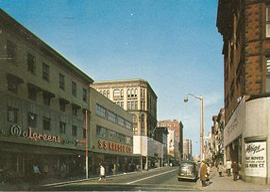
December 29, 2012

Bridgeport, Connecticut
As a child during the 1950s in the factory city of Bridgeport, CT, I constructed a social hierarchy that corresponded to where I thought the town’s ethnic groups belonged. I doubt that I arrived at these rankings on my own. More likely, I absorbed them from my parents or schoolmates. My distinctions were remarkably detailed and might strike younger readers as weird.
At the top of the pile were the WASPs. There seemed to be only a few of them in our city. They seemed as scarce as Native Americans, who didn”t thrive until the government gave Pequots the right to open casinos on their Connecticut tribal land.
The only white Protestants I knew back then were tony Episcopalians or long-faced Congregationalists. All these worthies, who my parents assured me had “always been around,” bore ancestral monikers adorned with the appropriate Roman numerals after their surnames. “We only have relatives”like our Uncle Mo”but these people have ancestors,” was how the situation was explained to me.
But this was not true of the entire breed, a fact that I didn”t learn until much later. If back then I had been told that some toothless ne”er-do-well who distilled moonshine in the Ozarks was a WASP, I never would have believed it. In my sixth-grade class a disheveled girl from the West Virginia mountains sat in front of me and kept uttering that unmentionable word “ain”t.” But I never suspected this creature was a Protestant. She was something called a “Baptist.”
Below WASPs in the rankings were German Jews, most of whose tribe had come to Bridgeport before or during World War II. They spoke to each other in their native tongue (which was interwar German) and usually owned moldering libraries that they rarely if ever dusted. These émigrés (not refugees) were supposed to have been something-or-other in Europe before you-know-who came to power. What made them stand out for me was their association with high culture (AKA Hochkultur). During the winter season they went to concerts at the New Haven Symphony and subscribed to tickets at a highly touted playhouse in nearby Westport. It was said that big shots from Broadway occasionally wandered into this place, but not one of them did so during my single visit to this temple of German exile culture. A family of subscribers once took me there, but as soon as it was discovered that I was about to cast my first vote in a presidential election for a Republican, our social relation abruptly ended.